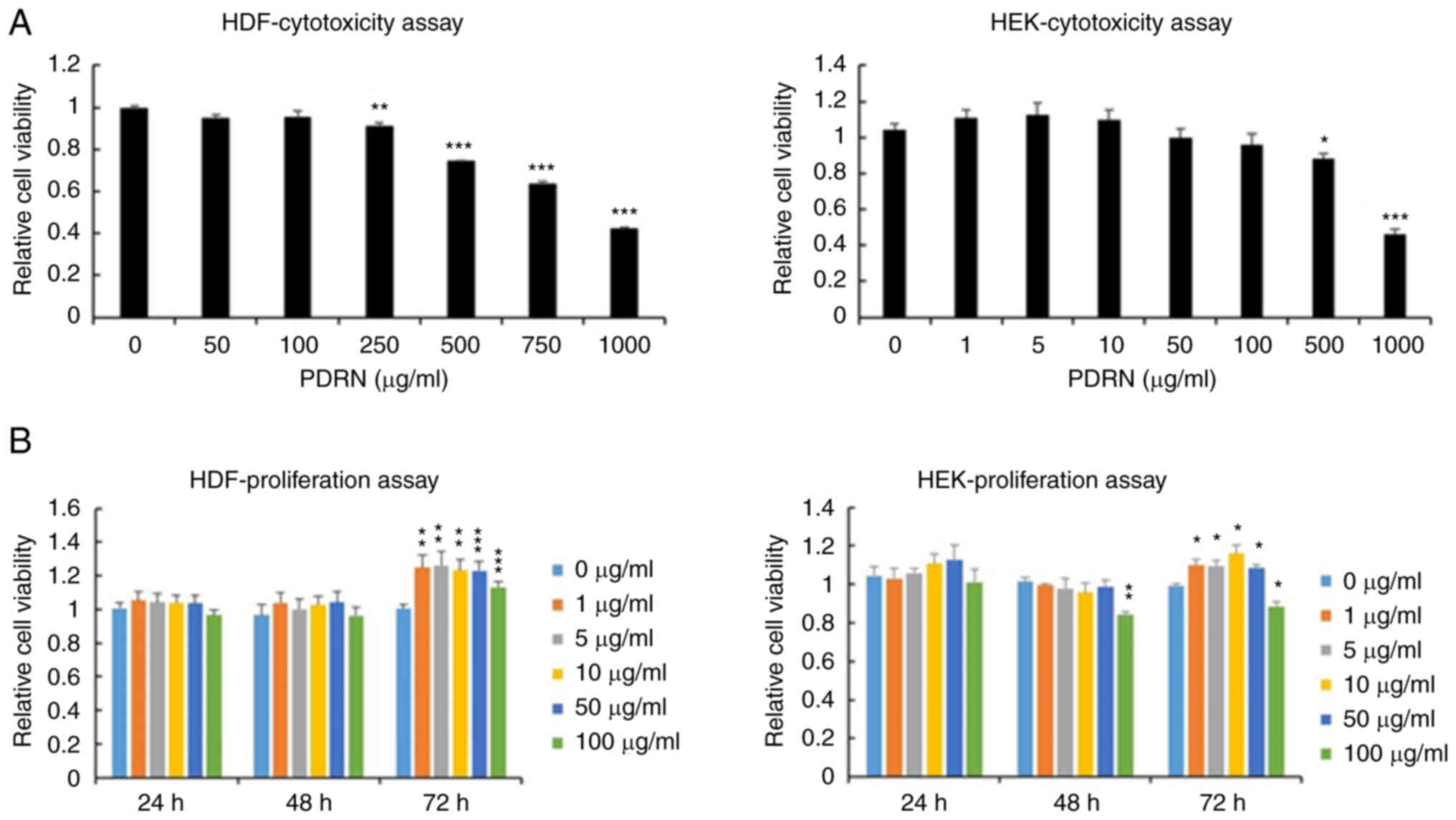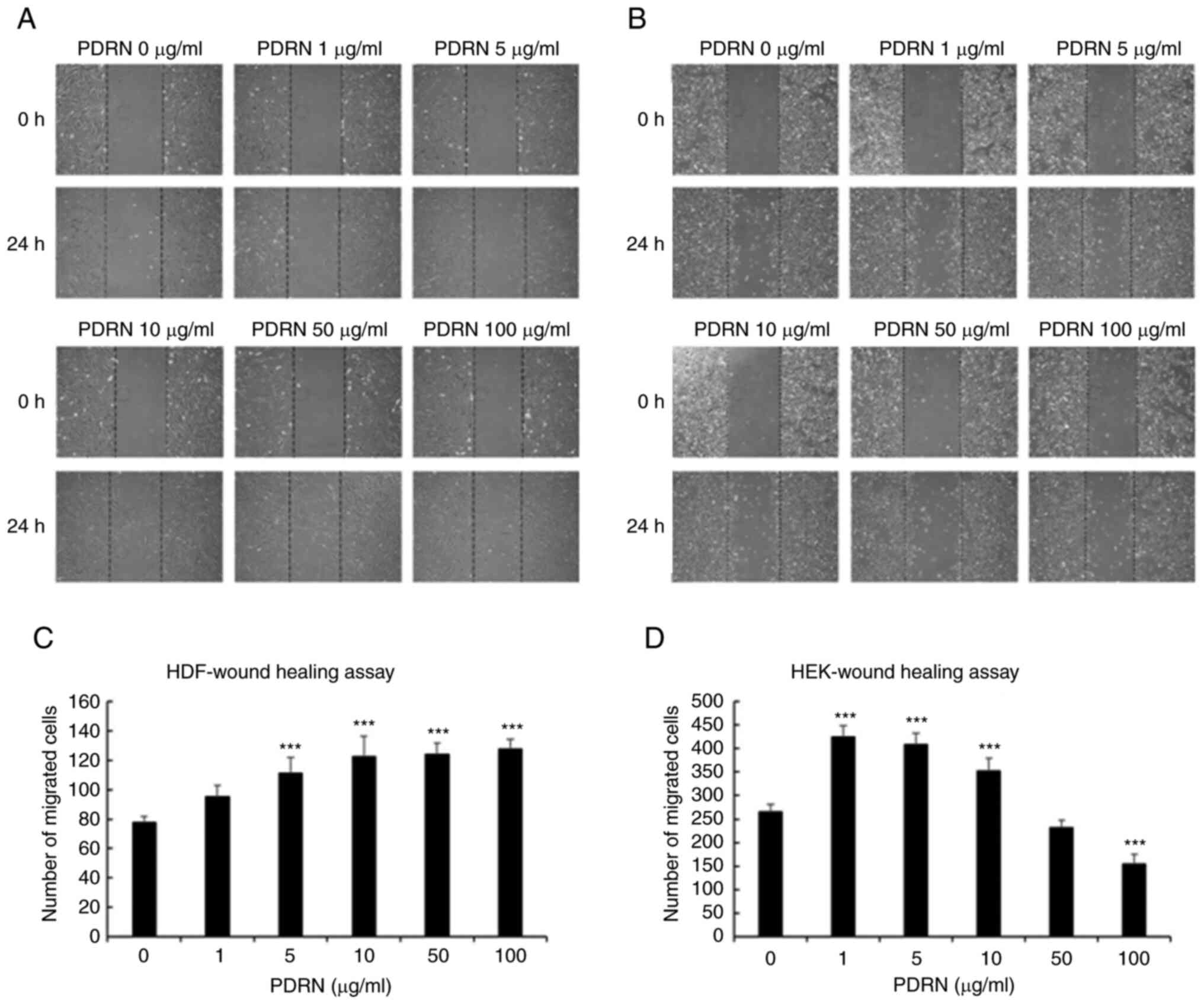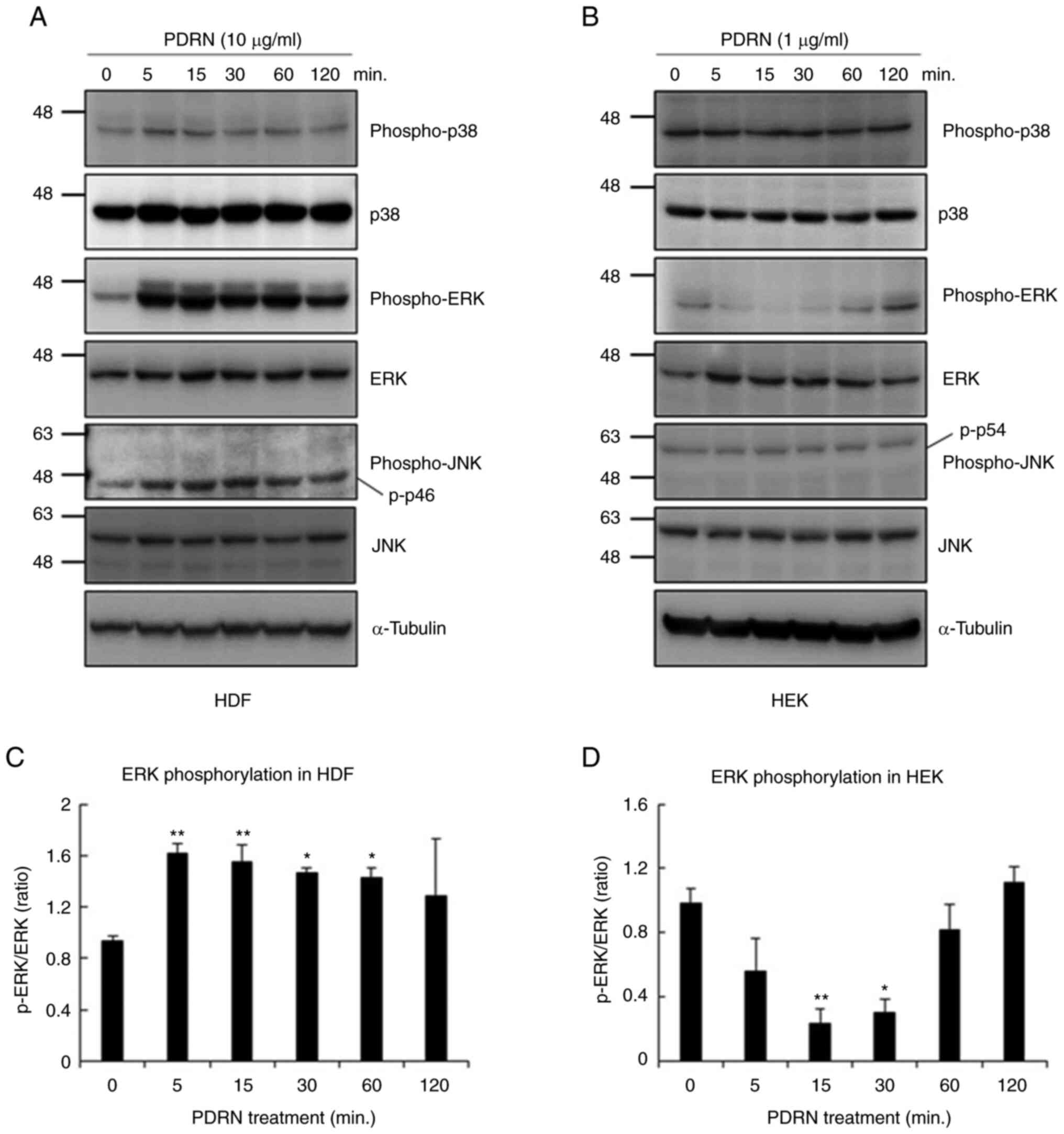|
1
|
El-Domyati M, Attia S, Saleh F, Brown D,
Birk DE, Gasparro F, Ahmad H and Uitto J: Intrinsic aging vs.
photoaging: A comparative histopathological, immunohistochemical,
and ultrastructural study of skin. Exp Dermatol. 11:398–405. 2002.
View Article : Google Scholar : PubMed/NCBI
|
|
2
|
Quan T and Fisher GJ: Role of
Age-associated alterations of the dermal extracellular matrix
microenvironment in human skin aging: A mini-review. Gerontology.
61:427–434. 2015. View Article : Google Scholar : PubMed/NCBI
|
|
3
|
Borg M, Brincat S, Camilleri G,
Schembri-Wismayer P, Brincat M and Calleja-Agius J: The role of
cytokines in skin aging. Climacteric. 16:514–521. 2013. View Article : Google Scholar : PubMed/NCBI
|
|
4
|
Bashir MM, Sharma MR and Werth VP: UVB and
proinflammatory cytokines synergistically activate TNF-alpha
production in keratinocytes through enhanced gene transcription. J
Invest Dermatol. 129:994–1001. 2009. View Article : Google Scholar : PubMed/NCBI
|
|
5
|
Agius E, Lacy KE, Vukmanovic-Stejic M,
Jagger AL, Papageorgiou AP, Hall S, Reed JR, Curnow SJ,
Fuentes-Duculan J, Buckley CD, et al: Decreased TNF-alpha synthesis
by macrophages restricts cutaneous immunosurveillance by memory
CD4+ T cells during aging. J Exp Med. 206:1929–1940. 2009.
View Article : Google Scholar : PubMed/NCBI
|
|
6
|
Dada LA and Sznajder JI: Mitochondrial
Ca2+ and ROS take center stage to orchestrate
TNF-α-mediated inflammatory responses. J Clin Invest. 121:1683–5.
2011. View
Article : Google Scholar : PubMed/NCBI
|
|
7
|
Pittayapruek P, Meephansan J, Prapapan O,
Komine M and Ohtsuki M: Role of matrix metalloproteinases in
photoaging and photocarcinogenesis. Int J Mol Sci. 17:8682016.
View Article : Google Scholar : PubMed/NCBI
|
|
8
|
Xia Z, Dickens M, Raingeaud J, Davis RJ
and Greenberg ME: Opposing effects of ERK and JNK-p38 MAP kinases
on apoptosis. Science. 270:1326–1331. 1995. View Article : Google Scholar : PubMed/NCBI
|
|
9
|
Verheij M, Bose R, Lin XH, Yao B, Jarvis
WD, Grant S, Birrer MJ, Szabo E, Zon LI, Kyriakis JM, et al:
Requirement for ceramide-initiated SAPK/JNK signalling in
stress-induced apoptosis. Nature. 380:75–79. 1996. View Article : Google Scholar : PubMed/NCBI
|
|
10
|
Raingeaud J, Gupta S, Rogers JS, Dickens
M, Han J, Ulevitch RJ and Davis RJ: Pro-inflammatory cytokines and
environmental stress cause p38 mitogen-activated protein kinase
activation by dual phosphorylation on tyrosine and threonine. J
Biol Chem. 270:7420–7426. 1995. View Article : Google Scholar : PubMed/NCBI
|
|
11
|
Shin MH, Rhie GE, Kim YK, Park CH, Cho KH,
Kim KH, Eun HC and Chung JH: H2O2 accumulation by catalase
reduction changes MAP kinase signaling in aged human skin in vivo.
J Invest Dermatol. 125:221–229. 2005. View Article : Google Scholar : PubMed/NCBI
|
|
12
|
Chen A and Davis BH: UV irradiation
activates JNK and increases alphaI(I) collagen gene expression in
rat hepatic stellate cells. J Biol Chem. 274:158–164. 1999.
View Article : Google Scholar : PubMed/NCBI
|
|
13
|
Brennan M, Bhatti H, Nerusu KC,
Bhagavathula N, Kang S, Fisher GJ, Varani J and Voorhees JJ: Matrix
metalloproteinase-1 is the major collagenolytic enzyme responsible
for collagen damage in UV-irradiated human skin. Photochem
Photobiol. 78:43–48. 2003. View Article : Google Scholar : PubMed/NCBI
|
|
14
|
Kim JY, Pak CS, Park JH, Jeong JH and Heo
CY: Effects of polydeoxyribonucleotide in the treatment of pressure
ulcers. J Korean Med Sci. 29 (Suppl 3):S222–S227. 2014. View Article : Google Scholar : PubMed/NCBI
|
|
15
|
Squadrito F, Bitto A, Irrera N, Pizzino G,
Pallio G, Minutoli L and Altavilla D: Pharmacological activity and
clinical use of PDRN. Front Pharmacol. 8:2242017. View Article : Google Scholar : PubMed/NCBI
|
|
16
|
Galeano M, Bitto A, Altavilla D, Minutoli
L, Polito F, Calò M, Lo Cascio P, Stagno d'Alcontres F and
Squadrito F: Polydeoxyribonucleotide stimulates angiogenesis and
wound healing in the genetically diabetic mouse. Wound Repair
Regen. 16:208–217. 2008. View Article : Google Scholar : PubMed/NCBI
|
|
17
|
Thellung S, Florio T, Maragliano A,
Cattarini G and Schettini G: Polydeoxyribonucleotides enhance the
proliferation of human skin fibroblasts: Involvement of A2
purinergic receptor subtypes. Life Sci. 64:1661–1674. 1999.
View Article : Google Scholar : PubMed/NCBI
|
|
18
|
Valdatta L, Thione A, Mortarino C, Buoro M
and Tuinder S: Evaluation of the efficacy of
polydeoxyribonucleotides in the healing process of autologous skin
graft donor sites: A pilot study. Curr Med Res Opin. 20:403–408.
2004. View Article : Google Scholar : PubMed/NCBI
|
|
19
|
Kim YJ, Kim MJ, Kweon DK, Lim ST and Lee
SJ: Polydeoxyribonucleotide activates mitochondrial biogenesis but
reduces MMP-1 activity and melanin biosynthesis in cultured skin
cells. Appl Biochem Biotechnol. 191:540–554. 2020. View Article : Google Scholar : PubMed/NCBI
|
|
20
|
Shin SM, Baek EJ, Oh DY, Kim KH, Kim KJ
and Park EJ: Functional validation of co-culture model of human
keratinocytes and neuronal cell line for sensitive skin by using
transient receptor potential channel vanilloid subfamily member 1
antagonist. Skin Res Technol. 29:e132752023. View Article : Google Scholar : PubMed/NCBI
|
|
21
|
Vangipuram M, Ting D, Kim S, Diaz R and
Schüle B: Skin punch biopsy explant culture for derivation of
primary human fibroblasts. J Vis Exp. 7:e37792013.PubMed/NCBI
|
|
22
|
Cho EB, Park GS, Park SS, Jang YJ, Kim KH,
Kim KJ and Park EJ: Effect of platelet-rich plasma on proliferation
and migration in human dermal fibroblasts. J Cosmet Dermatol.
18:1105–1112. 2019. View Article : Google Scholar : PubMed/NCBI
|
|
23
|
Yoo DH, Im YS, Oh JY, Gil D and Kim YO:
DUSP6 is a memory retention feedback regulator of ERK signaling for
cellular resilience of human pluripotent stem cells in response to
dissociation. Sci Rep. 13:56832023. View Article : Google Scholar : PubMed/NCBI
|
|
24
|
Kwon Y, Mehta S, Clark M, Walters G, Zhong
Y, Lee HN, Sunahara RK and Zhang J: Non-canonical β-adrenergic
activation of ERK at endosomes. Nature. 611:173–179. 2022.
View Article : Google Scholar : PubMed/NCBI
|
|
25
|
Livak KJ and Schmittgen TD: Analysis of
relative gene expression data using real-time quantitative PCR and
the 2(−Delta Delta C(T)) method. Methods. 25:402–408. 2001.
View Article : Google Scholar : PubMed/NCBI
|
|
26
|
Alvarado-Vazquez PA, Bernal L, Paige CA,
Grosick RL, Moracho Vilrriales C, Ferreira DW, Ulecia-Morón C and
Romero-Sandoval EA: Macrophage-specific nanotechnology-driven CD163
overexpression in human macrophages results in an M2 phenotype
under inflammatory conditions. Immunobiology. 222:900–912. 2017.
View Article : Google Scholar : PubMed/NCBI
|
|
27
|
Shan X, Zhang Y, Chen H, Dong L, Wu B, Xu
T, Hu J, Liu Z, Wang W, Wu L, et al: Inhibition of epidermal growth
factor receptor attenuates LPS-induced inflammation and acute lung
injury in rats. Oncotarget. 8:26648–26661. 2017. View Article : Google Scholar : PubMed/NCBI
|
|
28
|
Noh TK, Chung BY, Kim SY, Lee MH, Kim MJ,
Youn CS, Lee MW and Chang SE: Novel Anti-melanogenesis properties
of polydeoxyribonucleotide, a popular wound healing booster. Int J
Mol Sci. 17:14482016. View Article : Google Scholar : PubMed/NCBI
|
|
29
|
Hwang KH, Kim JH, Park EY and Cha SK: An
effective range of polydeoxyribonucleotides is critical for wound
healing quality. Mol Med Rep. 18:5166–5172. 2018.PubMed/NCBI
|
|
30
|
Veronesi F, Dallari D, Sabbioni G, Carubbi
C, Martini L and Fini M: Polydeoxyribonucleotides (PDRNs) from skin
to musculoskeletal tissue regeneration via adenosine A2A
receptor involvement. J Cell Physiol. 232:2299–2307. 2017.
View Article : Google Scholar : PubMed/NCBI
|
|
31
|
Altavilla D, Bitto A, Polito F, Marini H,
Minutoli L, Di Stefano V, Irrera N, Cattarini G and Squadrito F:
Polydeoxyribonucleotide (PDRN): A safe approach to induce
therapeutic angiogenesis in peripheral artery occlusive disease and
in diabetic foot ulcers. Cardiovasc Hematol Agents Med Chem.
7:313–321. 2009. View Article : Google Scholar : PubMed/NCBI
|
|
32
|
Han JH, Jung J, Hwang L, Ko IG, Nam OH,
Kim MS, Lee JW, Choi BJ and Lee DW: Anti-inflammatory effect of
polydeoxyribonucleotide on zoledronic acid-pretreated and
lipopolysaccharide-stimulated RAW 264.7 cells. Exp Ther Med.
16:400–405. 2018.PubMed/NCBI
|
|
33
|
Sini P, Denti A, Cattarini G, Daglio M,
Tira ME and Balduini C: Effect of polydeoxyribonucleotides on human
fibroblasts in primary culture. Cell Biochem Funct. 17:107–114.
1999. View Article : Google Scholar : PubMed/NCBI
|
|
34
|
Singer AJ and Clark RA: Cutaneous wound
healing. N Engl J Med. 341:738–746. 1999. View Article : Google Scholar : PubMed/NCBI
|
|
35
|
Gurtner GC, Werner S, Barrandon Y and
Longaker MT: Wound repair and regeneration. Nature. 453:314–321.
2008. View Article : Google Scholar : PubMed/NCBI
|
|
36
|
Lavker RM: Structural alterations in
exposed and unexposed aged skin. J Invest Dermatol. 73:59–66. 1979.
View Article : Google Scholar : PubMed/NCBI
|
|
37
|
Gilchrest BA: Skin aging and photoaging:
An overview. J Am Acad Dermatol. 21:610–603. 1989. View Article : Google Scholar : PubMed/NCBI
|
|
38
|
Fisher GJ, Wang ZQ, Datta SC, Varani J,
Kang S and Voorhees JJ: Pathophysiology of premature skin aging
induced by ultraviolet light. N Engl J Med. 337:1419–2148. 1997.
View Article : Google Scholar : PubMed/NCBI
|
|
39
|
Varani J, Warner RL, Gharaee-Kermani M,
Phan SH, Kang S, Chung JH, Wang ZQ, Datta SC, Fisher G and Voorhees
JJ: Vitamin A antagonizes decreased cell growth and elevated
collagen-degrading matrix metalloproteinases and stimulates
collagen accumulation in naturally aged human skin. J Invest
Dermatol. 114:480–486. 2000. View Article : Google Scholar : PubMed/NCBI
|
|
40
|
Chung JH, Seo JY, Choi HR, Lee MK, Youn
CS, Rhie G, Cho KH, Kim KH, Park KC and Eun HC: Modulation of skin
collagen metabolism in aged and photoaged human skin in vivo. J
Invest Dermatol. 117:1218–1224. 2001. View Article : Google Scholar : PubMed/NCBI
|
|
41
|
Sárdy M: Role of matrix metalloproteinases
in skin ageing. Connect Tissue Res. 50:132–138. 2009. View Article : Google Scholar : PubMed/NCBI
|
|
42
|
Fisher GJ, Choi HC, Bata-Csorgo Z, Shao Y,
Datta S, Wang ZQ, Kang S and Voorhees JJ: Ultraviolet irradiation
increases matrix metalloproteinase-8 protein in human skin in vivo.
J Invest Dermatol. 117:219–226. 2001. View Article : Google Scholar : PubMed/NCBI
|
|
43
|
Neagu M, Constantin C, Caruntu C, Dumitru
C, Surcel M and Zurac S: Inflammation: A key process in skin
tumorigenesis. Oncol Lett. 17:4068–4084. 2019.PubMed/NCBI
|
|
44
|
López-Camarillo C, Ocampo EA, Casamichana
ML, Pérez-Plasencia C, Alvarez-Sánchez E and Marchat LA: Protein
kinases and transcription factors activation in response to
UV-radiation of skin: Implications for carcinogenesis. Int J Mol
Sci. 13:142–172. 2012. View Article : Google Scholar : PubMed/NCBI
|
|
45
|
Rosette C and Karin M: Ultraviolet light
and osmotic stress: Activation of the JNK cascade through multiple
growth factor and cytokine receptors. Science. 274:1194–1197. 1996.
View Article : Google Scholar : PubMed/NCBI
|
|
46
|
Huang RP, Wu JX, Fan Y and Adamson ED: UV
activates growth factor receptors via reactive oxygen
intermediates. J Cell Biol. 133:211–220. 1996. View Article : Google Scholar : PubMed/NCBI
|
|
47
|
Peus D, Meves A, Vasa RA, Beyerle A,
O'Brien T and Pittelkow MR: H2O2 is required for UVB-induced EGF
receptor and downstream signaling pathway activation. Free Radic
Biol Med. 27:1197–1202. 1999. View Article : Google Scholar : PubMed/NCBI
|
|
48
|
Son Y, Cheong YK, Kim NH, Chung HT, Kang
DG and Pae HO: Mitogen-activated protein kinases and reactive
oxygen species: How can ROS activate MAPK pathways? J Signal
Transduct. 2011:7926392011. View Article : Google Scholar : PubMed/NCBI
|
|
49
|
Kang JS, Kim HN, Jung DJ, Kim JE, Mun GH,
Kim YS, Cho D, Shin DH, Hwang YI and Lee WJ: Regulation of
UVB-induced IL-8 and MCP-1 production in skin keratinocytes by
increasing vitamin C uptake via the redistribution of SVCT-1 from
the cytosol to the membrane. J Invest Dermatol. 127:698–706. 2007.
View Article : Google Scholar : PubMed/NCBI
|
|
50
|
Trefzer U, Brockhaus M, Lötscher H, Parlow
F, Budnik A, Grewe M, Christoph H, Kapp A, Schöpf E, Luger TA, et
al: The 55-kD tumor necrosis factor receptor on human keratinocytes
is regulated by tumor necrosis factor-alpha and by ultraviolet B
radiation. J Clin Invest. 92:462–470. 1993. View Article : Google Scholar : PubMed/NCBI
|
|
51
|
Takii T, Akahoshi T, Kato K, Hayashi H,
Marunouchi T and Onozaki K: Interleukin-1 up-regulates
transcription of its own receptor in a human fibroblast cell line
TIG-1: Role of endogenous PGE2 and cAMP. Eur J Immunol.
22:1221–1227. 1992. View Article : Google Scholar : PubMed/NCBI
|
|
52
|
Bitto A, Polito F, Irrera N, D'Ascola A,
Avenoso A, Nastasi G, Campo GM, Micali A, Bagnato G, Minutoli L, et
al: Polydeoxyribonucleotide reduces cytokine production and the
severity of collagen-induced arthritis by stimulation of adenosine
A(2A) receptor. Arthritis Rheum. 63:3364–3371. 2011. View Article : Google Scholar : PubMed/NCBI
|
|
53
|
Castellini C, Belletti S, Govoni P and
Guizzardi S: Anti Inflammatory property of PDRN-An in vitro study
on cultured macrophages. Adv Bioscience Biotechnol. 8:13–26. 2017.
View Article : Google Scholar
|



















